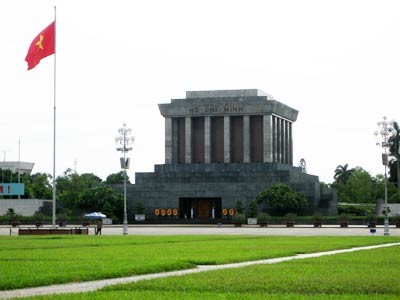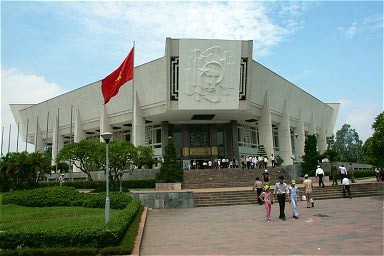A: Welcome to VOV’s Letter Box. This feature airs every Wednesday. These days, the atmosphere of the traditional Lunar New Year, Tet, floods Vietnam. Vietnamese people, both inside and outside the country, are busy preparing for Tet, the biggest celebration of the year. As usual, part of the letters and emails sent to us are questions about Vietnam.
B: Ratan Kumar Paul, coordinator of the South Asia CRI DXER Forum in West Bengal, India, wants to know about the Ho Chi Minh Mausoleum and the Ho Chi Minh Museum.
 |
| Ho Chi Minh Mausoleum is a large memorial next to Ba Dinh Square |
A: In fact, it’s a complex that includes Ho Chi Minh’s Mausoleum - the final resting place of Vietnam’s Uncle Ho, Ho Chi Minh stilt house - where Uncle Ho lived off and on from 1958 to 1969, the Ho Chi Minh museum – which provides all kinds of information about President Ho Chi Minh, and the One Pillar and Dien Huu Pagodas.
B: The Ho Chi Minh Mausoleum is a large memorial next to Ba Dinh Square where Uncle Ho read the Vietnamese Declaration of Independence on September 2, 1945, establishing the Democratic Republic of Vietnam. Construction began in 1973, and the structure was formally inaugurated in 1975. It’s 21.6 meters high and 41.2 meters wide.
A: There are many interesting things about the Ho Chi Minh Mausoleum but the most impressive things is the plaza in front of the mausoleum, which is divided by foot paths into 240 green squares. The gardens adjoining the mausoleum contains 250 species of plants and flowers, from every region of Vietnam.
B: Inside the mausoleum is the embalmed body of Ho Chi Minh, preserved in the temperature-controlled central hall of the mausoleum and protected by a military honor guard. The body lies in a dimly-lit glass case. A line of visitors, which often includes visiting foreign dignitaries, usually has a rather long wait to enter and pay respects to Uncle Ho.
A: Inside visitors must keep silent and have only a minute to stop in front of the glass enclosure where Uncle Ho lies. Uncle Ho is dressed in his traditional khaki clothes and rubber sandals, and looks as if he is just taking a nap.
B: Ho Chi Minh is a huge cultural leader in Vietnam and every town seems to have a museum devoted to him. While in Vietnam you absolutely must see at least one Ho Chi Minh Museum but the one in Hanoi is best. Although the outside of the building is quite imposing, it will take you only an hour at the most to make your way through the museum. If you visit the museum during the week you have a good chance of seeing grade school classes in their white shirts and blue-bottomed uniforms lining up in front of the museum for pictures and a tour.
 |
| Ho Chi Minh Museum in Hanoi |
A: President Ho Chi Minh was a great national leader, but he is also famous as a poet. Especially when the Tet atmosphere is all around, people remember Uncle Ho’s New Year poems which are full of love and warm sentiments toward all people.
B: Uncle Ho’s New Year poems which were addressed to all people inside and outside the country, civilians and soldiers alike usually praised the achievements of the passing year, outlined missions and orientations for the coming year, and called on all to do their utmost to fulfill set targets..
A: Of the 22 New Year poems Uncle Ho wrote between 1942 and 1969, the one work entitled the 15th Lunar Poetry Night (Nguyen Tieu) written in February, 1948, is best known and has appeared in literature textbooks for generations of pupils. Here’s an English translation of the poem by Huynh Diep:
The full-moon in Spring's enlightened
making rivers and sky mixed and fresher;
Military strategy deliberated in the middle of stream;
Unboundedly shining, a boatful of moonlight at midnight.
B: You’re listening to VOV’s Letter Box, broadcast every Wednesday. The song you just heard was about the spring of 1969. The lyrics are a Ho Chi Minh poem set to music by Huy Thuc who is well-known for setting poems to music. We’re happy to have received so many letters and emails last week in which listeners asked questions about Vietnam. But due to time constraints, we can’t answer all of them immediately. Rana Dewan Rafiqul, President of the Friends Radio Club in Hossain, Bangladesh, is one of our most faithful listeners.
A: Rana loves our English program so much that he not only reports what he listens to, but also shows his keen interest in Vietnam. This time, he wanted to know more about Vietnam’s younger generation. We can’t get into it today, Rana, but we promise to give you an answer in a future program, so be sure to tune in to our program regularly.
B: Bruce Portzer of Seattle, USA, listened to our program on January 20th from 02h30 to 03h00 UTC on a frequency of 9640 kHz. He gave us a detailed report on that broadcast, and also a program he heard in July. We’re very impressed by his archive ability.
A: On every Letter Box show, we try to mention as many listeners as possible, so hello, Stefan Greb of Germany, who has been listening to the English programs since our senior staff started working here. We’re glad to receive a letter from you again, Stefan, but we’re sorry to hear you were too ill most of last year to listen to our program. Get better soon, Stefan, and good luck to you.
B: We would like to thank Valerian Massarenhos of Karnataka, India, for sending a nice greeting card. This time Valerian sent us a letter confirming that he received all the gifts the English section sent him.
B: Of course, every week, we send our regards to regular listeners like Hannu Kiiski of Hamina, Finland and Yoshihiro Kusanagi of Ota-ku, Tokyo, Japan. Last week, we got a new name from Finland. Rodney Soderlund of Hanko sent a nice pic showing an aerial view of his hometown. Muneer Kaitha Parambath of Calicut, Kerala, India, Vasily Strelnikov of Moscow, Russia, and other listeners sent us postal or electronic letters.
A: All of them reported the contents of the English programs they heard and commented on technical aspects and the program content. We greatly appreciate this feedback. All your reception reports were complete enough to earn letters of confirmation. If your name wasn’t mentioned this week, don’t feel left out. We’ll try to acknowledge you next time.
B: That’s it for today’s Letter Box. Please keep in touch. We look forward to receiving your comments and suggestions. Our contact address is:
English section,
Overseas Service, Radio the Voice of Vietnam,
45 Ba Trieu Street, Hanoi, Vietnam
B: Or you can email us at: englishsection@vov.org.vn. If you miss any of our programs, you can always catch up by logging onto our website at: www.vovworld.vn, where you can hear both live broadcasts and previously recorded programs.